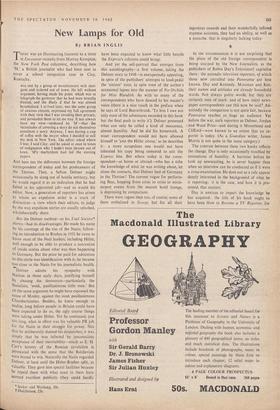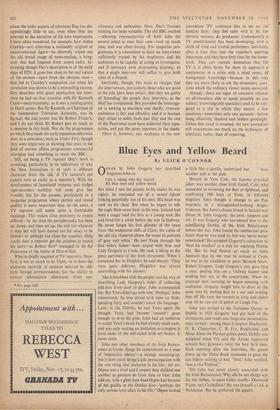New Lamps for Old
By BRIAN INGLIS
THERE was an illuminating tootnote to a letter in. Encounter recently from Murray Kempton, the New York Post columnist, describing how `M,' a British journalist who had been sent to cover a school integration case in Clay, Kentucky.
was met by a group of mountaineers with shot- guns and ordered out of town. He left without argument, having made his point, which was to telegraph the governor that he had been brutally treated, and the Daily Z that he was almost hospitalised. 1 arrived later, met the same group of anxious citizens, expressed my full agreement with their view that I was invading their privacy, and persuaded them to let me stay. It has always been my view—unshared by 'M'—that the vicissitudes of covering a story do not themselves constitute a story. Anyway, 1 was having a cup of coffee with the mayor when I decided to call my desk in New York. The editor asked where 1 was; I said Clay; and he asked at once in tones of indignation why 1 hadn't been thrown out of town. 'M's martyrdom had led the evening papers.
And here lies the difference between the foreign correspondent of today and his predecessors of the Thirties. Then, a Sefton Delmer might occasionally be slung out of hostile territory, but he would regard it as an indication that he had failed in his appointed job—and so would his editor. Now, a generation of reporters has arisen to whom an expulsion order is a mark of distinction—a view which their editors, to judge by the way expulsion stories are usually splashed, wholeheartedly share.
But the Delmer method—as his Trail Sinister* shows—had its disadvantages. He made his name by his coverage of the rise of the Nazis; follow- ing an introduction to Roehm in 1931 he came to know most of the Nazi leaders; including Hitler, well enough to be able to produce a succession of inside stories about what was then happening In Germany. But the price he paid for admission to this circle was identification with it; he became too close to the Nazis for his journalistic health.
Delmer admits his sympathy with Nazism in those early days, justifying himself by abusing the democrats—particularly the Socialists; `weak, pusillanimous little men.' But on the same argument he might have espoused the cause of Mosley, against the weak pusillanimous Chamberlainites. Besides, he knew enough to realise, long before people in Britain could have been expected to do so, the ugly course things were taking under Hitler. Yet he continued, just too long, what in effect was his valuable PR job for the Nazis in their struggle for power. Not that he deliberately slanted his despatches; it was simply that he was infected by unconscious acceptance of their inevitability—much as E. H. Carr's history of the Russian revolution is permeated with the sense that the Bolshevists were bound to win. Naturally the Nazis regarded Delmer, at least until the Hitler-Roehm split, as valuable. They gave him special facilities because he repaid them with what must to them have seemed excellent publicity (they could hardly * Seeker and Warburg, 30s. t Hutchinson, 25s. have been expected to know what little benefit the Express's columns could bring).
And yet the self-portrait that emerges from this autobiography—a first volume, , taking the Delmer story to 1948—is unexpectedly appealing, in spite of the publishers' attempts to loud-pedal the 'sinister' note; in spite even of the author's occasional lapses into the manner of No Orchids for Miss Blandish. As with so many of the correspondents who have danced to his master's voice (there is a nice touch in the preface when he says of Lord Beaverbrook, 'To him I owe not only most of the adventures recorded in this book but the final push to write it'), Delmer possessed what can only be called a kind of innocence, almost humility. And he did his homework. A wiser correspondent would not have allowed himself to 'join the Hitler circus,' as he describes it: a more scrupulous one would not have tolerated his copy being censored to suit the Express line. But where today is the corre- spondent—at home or abroad—who has a tithe the knowledge of what he was writing about, let alone the contacts, that Delmer had of Germany in the Thirties? The current vogue for perform- ing fleas, hopping from crisis to crisis to misin- terpret events from the nearest hotel lounge, is depressing by comparison.
There were rogues then too, of course, some of them embalmed in Scoop; but for all their ingenious canards and their wonderfully inflated expense accounts, they had an ability, as well as a panache. that is singularly lacking today.
In the circumstances it is not surprising that the place of the old foreign correspondent is being usurped by the New Journalists, as the publishers of Robin Day's Televisiont capitalise them : the nomadic television reporters, of which those now corralled into Panorama are best known. Day and Kennedy, Mossman and Kee; their names and attitudes are already household words. Not always polite words, but they are certainly men of mark; and of how many news- paper correspondents can this now be said? Ad- mittedly the comparison is not quite fair, because Panorama reaches so huge an audience. Yet before the war, such reporters as Delmer, Jordan and Ward Price—and during it Moorehead and Clifford—were known to an extent that no re- porter is today. (As a Guardian writer, James Morris is not quite in the same category.) The contrast between these two books reflects the change. Day is only occasionally troubled by intimations of humility. A barrister before he took up newscasting, he is never happier than when an interview can be conducted as if it were a cross-examination. He does not as a rule appear deeply interested in the background of what he is reporting: it is the case, and how it is pre- sented, that matters.
Day is anxious to impart the knowledge he has acquired: the title of his book ought to have been How to Become a TV Reporter, for about the wider aspects of television Day has dis- appointingly little to say, even when they are relevant to the narrative of his own experiences. I have often wondered, for example, how Aidan Crawley—not otherwise a noticeably original or unconventional figure—so shrewdly wiped out the old brand image of news-reading, a hang- over that had lingered from sound radio. In- teresting though Day's description is of the early days of ITN, it gives few clues to the real nature of the stresses—apart from the obvious ones— that led to Crawley's resignation just when his revolution was shown to be a resounding success. Day describes with great satisfaction the inter- view he had on that occasion with Sir Kenneth Clark—understandably, as it was a turning-point in Day's career. But Sir Kenneth, as Chairman of the Independent Television Authority, was its fig-leaf; the real power was Sir Robert Fraser's; and I do not think Sir Robert gets so much as a mention in this book. Nor do the programmes on which Day made his early reputation otherwise than as a newcaster, such as Under Fire; though they were important as showing that even in the field of current affairs programmes commercial television had something to teach the BBC.
Still, on being a TV reporter Day's book is revealing; particularly in its indications of why the New Journalism is of such a different character from the old. A TV camera's eye cannot rove as easily as a reporter's. With the development of hand-held cameras and midget tape-recorders mobility will soon give less trouble; but for the present, particularly in a magazine programme where picture and sound quality is more important than on the news, a TV reporter still needs quite a formidable equipage. This makes close proximity to events difficult: by the time the paraphernalia has been set down, and then set up, the riot (or whatever it may be) will have moved too far away to be filmed—or perhaps too close for comfort. Only rarely does a reporter get the pictures to match his story—as Robert Kee* managed to do for Panoraina at the battle of Diar-el-Kef.
What is chiefly required of TV reporters, there- fore, is not so much to be There, or to have the elaborate network of contacts beloved by old- style foreign correspondents, but the ability to extract information afterwards from eye- ' See page 660. witnesses and authorities. Here, Day's forensic training has been valuable. The old BBC method —allowing representatives of both sides (or several sides) to state their case—took up much time, and was often boring. For magazine pro- grammes it is convenient to have an interviewer sufficiently trusted by his employers and his audiences to be capable of acting as investigator, and if necessary even prosecuting attorney; so that a single interview will suffice to give both sides of a dispute.
Inevitably, though, this leads to charges that the interviewers, particularly those who are good at the job, have been unfair; that they are guilty of 'hounding' the people they intetview, as the Mail has complained. But provided the interroga- tor is seeking to elucidate and clarify, cross-ex- amination is fair and effective; and it is because they refuse to suffer fools that Day and the rest of the Panorama team have achieved their repu- tation, and put the press reporters in the shade.
There • is, however, one weakness in the new journalism. TV audiences like to see an old familiar face : they feel safer with it. So, for obvious reasons, do producers. Consequently a TV establishment has been developing, with a circle of tried and trusted performers. Inevitably after a time they lose the reporter's questing innocence; and they have little time for the home- work. They can console themselves that for TV it is often better for them to approach a controversy or a crisis with a mind empty of background knowledge—because in this way they are more likely to ask the elementary ques- tions which the ordinary viewer wants answered.
Already, there are signs of excessive reliance on all-rounders, able to speak passably on any subject; knowledgeable specialists tend to be rele- gated to a slot in which they answer a few questions—sometimes only one question—before being effusively thanked and bidden goodnight. Unless this trend is reversed, the new journalists will concentrate too much on the techniques of television, rather than of reporting.











































 Previous page
Previous page